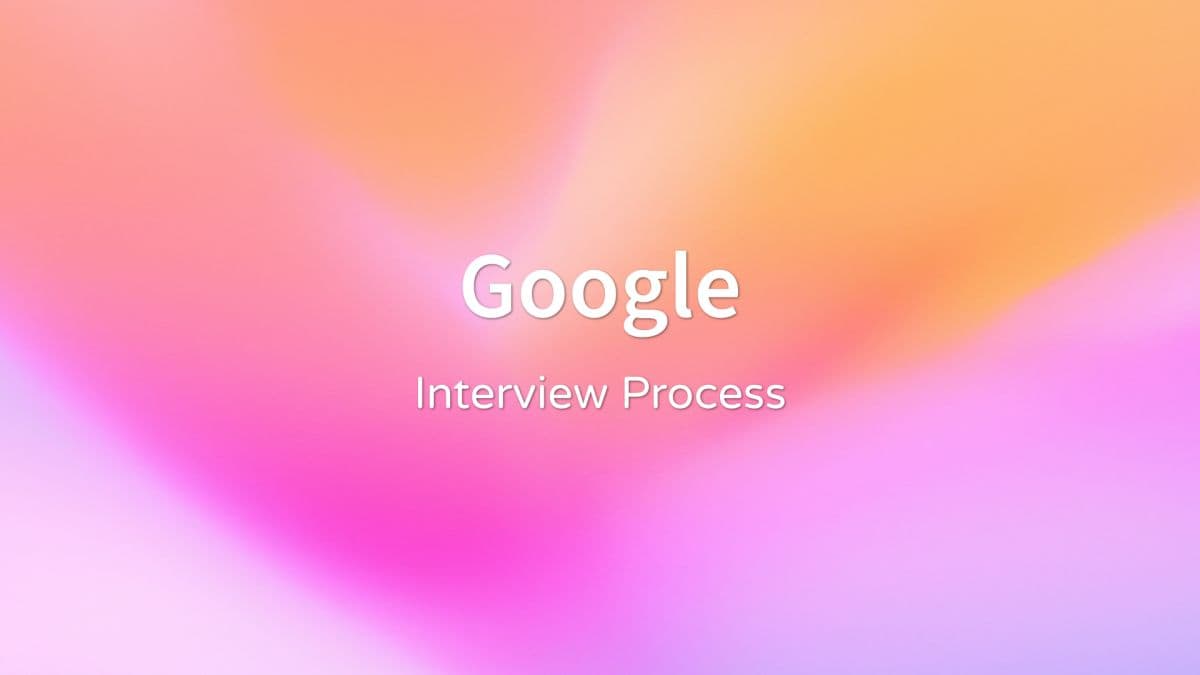Google's Interview Process (2026)
Blog / Google's Interview Process (2026)

The Google interview process is a rigorous, well-structured pipeline designed to identify top talent for one of the world’s leading tech giants. It typically unfolds as follows:To prepare effectively, focus your study plan on three core areas:1. Data Structures & Algorithms (DSA)Google is renowned for its emphasis on algorithmic problem-solving, frequently drawing from LeetCode-style questions. The most effective way to prepare is to focus on the most frequently asked problems, prioritizing medium and hard difficulty levels. Efficiency matters: Aim to solve each question in 20–25 minutes during practice while maintaining optimal time and space complexity. Equally important is clear communication: interviewers expect you to articulate your thought process thoroughly, explaining your progression from brute force to optimized solutions. You can practice these high-impact questions using our collection of Google questions to maximize your preparation and confidence.2. System DesignSystem design interviews at Google often center on large-scale, real-world systems tied to their products, such as designing YouTube’s video streaming or Google Drive. Expect interviewers to probe deeply into design patterns and principles, emphasising scalability, latency, and availability. Remember to discuss trade-offs between consistency and performance, and strategies for handling billions of users. Key concepts to master include distributed computing, caching, networks, and database design (both SQL and NoSQL). Practice sketching architectures on a whiteboard and clearly explaining your reasoning using our AI System Design Whiteboard - demonstrating clarity and structured thinking is just as important as technical depth.Effective preparation will help you communicate your solutions confidently and think critically under pressure.3. Behavioural questionsGoogle’s behavioral interviews assess “Googleyness” - a mix of cultural fit, curiosity, and adaptability. Questions often tie back to their values, like collaboration and innovation.Practice using the STAR method (Situation, Task, Action, Result) to structure your responses concisely.Common themes include: To prepare for Google’s behavioral interviews, you can use our Behavioral Course, which teaches you how to structure and answer typical interview behavioral questions effectively, helping you communicate your experiences and thought process with confidence.ConclusionLuckily for you, we’ve already compiled the most frequently asked behavioral questions across all three categories and provided detailed solutions for each. You can check them out here. Working through these materials will help you focus your preparation, save time, and build the confidence needed to tackle interviews effectively. For a structured path through every stage of the process, follow our Google Interview Roadmap, which guides you step by step from preparation to offer.
- Resume Screening: An initial review of your background, experience, and qualifications to assess fit for the role.
- Recruiter Call: A conversation with a recruiter to discuss your experience, motivation, and alignment with Google’s values.
- Online Assessment (OA): Typically includes 2–3 LeetCode-style DSA questions designed to evaluate problem-solving skills, coding efficiency, and algorithmic thinking.
- Technical Interviews: Usually 4–5 rounds covering data structures and algorithms, system design, and sometimes domain-specific knowledge. These interviews assess both technical ability and how you approach complex problems and communicate solutions.
- Behavioral Interview: Focused on Google’s culture and “Googleyness,” evaluating collaboration, leadership, and alignment with company values.
- Hiring Committee Review and Decision: Feedback from all interview rounds is consolidated to make a final hiring decision based on technical performance, behavioral fit, and overall potential.
- Data Structures & Algorithms (DSA)
- System Design
- Behavioural questions
- Problem-Solving (e.g., “Tell me about a time you tackled an ambiguous problem”)
- Teamwork (e.g., “Describe a situation where you resolved a conflict in a team”)
- Growth Mindset (e.g., “Give an example of when you learned something new to solve a challenge”)
About TechPrep
You shouldn't have to struggle with interview anxiety. TechPrep empowers software engineers to stop guessing and start getting offers. We provide the exact, curated roadmap you need to master Data Structures, System Design, and Practical coding rounds. Join thousands of engineers who have turned rejections into dream jobs at top tech companies.